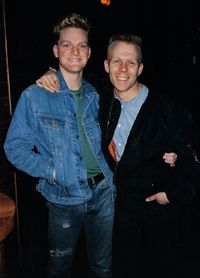Erasure
| Erasure | |
|---|---|
 Erasure on tour in 2007 |
|
| Background information | |
| Origin | England |
| Genres | Synthpop, New Wave |
| Years active | 1985–present |
| Labels | Mute, Sire, Reprise |
| Associated acts | Andy Bell Yazoo The Assembly Depeche Mode |
| Website | http://erasureinfo.com |
| Members | |
| Vince Clarke Andy Bell |
|
Erasure are an English synthpop duo, consisting of songwriter and keyboardist Vince Clarke and singer Andy Bell. Erasure entered the music scene in 1985 with their debut single "Who Needs Love Like That". Following the release of their fourth single "Sometimes", the duo established themselves on the UK Singles Chart and became one of the most successful artists of the late 1980s and early 1990s.
From 1986 to 1997, Erasure achieved twenty-four consecutive Top 20 hits in the UK, while their Top 20 hits in the USA (on the Billboard Hot 100) included "A Little Respect", "Chains of Love" and "Always". By 2007, 34 of their 41 singles had made the UK Top 40, with 17 climbing into the Top 10. Labeled "the definitive synthpop superstars",[1] the duo is most popular in their native UK and Mainland Europe (especially Germany, Denmark and Sweden) and also in South America (especially in Argentina, Chile and Peru). To date, Erasure has sold over 25 million albums worldwide.[2]
The band also enjoys popularity within the LGBT community, as its openly gay singer, Andy Bell, has become a gay icon.[3]
Contents |
History
Vince Clarke was a founding member of Depeche Mode and sole writer of their first three singles (including the breakthrough Top 10 hit "Just Can't Get Enough"). After leaving the band in 1981, Clarke forged an equally successful career with the duo Yazoo (known as Yaz in the U.S.). After two hit albums in as many years, he split with Yazoo partner Alison Moyet and briefly formed The Assembly with producer Eric Radcliffe. The project spawned a UK number four hit single, "Never Never," featuring Feargal Sharkey on vocals. Clarke then released another single with vocalist Paul Quinn, "One Day." It flopped, leading Clarke to place an advertisement in Melody Maker looking for a vocalist for a new musical project. He selected Andy Bell, whose voice would often be compared to Moyet's.
Erasure's first three singles were commercial failures in the UK, although the third, "Oh L'amour", charted well in Australia and some European countries (especially in France, where it still remains Erasure's only hit to date). It was with the release of their fourth single, "Sometimes", that Erasure finally received recognition in the UK in late 1986. This song peaked at number 2 and spent many weeks in the UK Top 40, marking the beginning of a long string of hits for the duo.
The single's parent album, The Circus, hit number 6 and turned platinum in the UK with three additional hit singles - "It Doesn't Have To Be", "Victim of Love" and "The Circus". The album remained on the charts for over a year.
Erasure's third album, The Innocents, was released in 1988. Preceded by the Top 10 single "Ship of Fools", the album hit number one in the UK on its initial release and returned to the summit a year later, eventually going triple platinum. It also turned platinum in the U.S., generating two Top 20 hits in "Chains of Love" and "A Little Respect".
The Innocents was the first of five consecutive number one albums for Erasure in the UK, including the greatest hits compilation Pop! The First 20 Hits. Wild! (1989) and Chorus (1991) both contained four Top 20 singles and were big sellers.
In late 1988, the Crackers International EP, led by the song "Stop!", hit number 2 in the UK singles chart. This was bettered in 1992 by another EP, Abba-esque, covering four ABBA hits, which became Erasure's first (and to date only) number one in the UK Singles Chart. Later that year, a singles compilation, Pop! - the First 20 Hits, also hit number one and went triple platinum.
In 1994, Erasure released I Say I Say I Say, their fifth consecutive number one in the UK Albums Chart. Its first single, "Always", became the band's third Top 20 hit in the United States.
The 1995 release of the album Erasure marked a determined shift away from Erasure's signature three-minute synth-pop to a more introspective sound.
In spite of a return to three-minute pop songs, the 1997 album Cowboy did not restore the success of their 1986-1994 era. Cowboy enjoyed a short-lived success, peaking at number ten in the UK but lasting only two weeks in the UK Top 40.
In 2000, the album Loveboat was released, peaking at a lowly number 45.
The 2003 release Other People's Songs was a collection of cover versions; one of which, Peter Gabriel's song "Solsbury Hill" reached number ten in the UK. Erasure were invited to perform on Top of the Pops for the first time since March 1997.[4]
Erasure's 2005 album Nightbird's first single, "Breathe", reached number four in the UK charts (their first Top 5 hit in more than a decade) and achieved the number one position on the U.S. Dance Chart, eighteen years after their first chart-topper. The next single, "Don't Say You Love Me", enabled purchasers to configure their own remixes of the single through the band's website, with each variant of the song limited to a single download.
Union Street was a 2006 side-project which featured a collection of previously released album tracks that the band reinterpreted in an acoustic/country & western style. The album was named after the recording studio in Brooklyn where it was recorded.

The duo then released a more 'dance oriented' album than some of their more recent work. Titled Light at the End of the World, the album was produced by Gareth Jones and was released on 21 May 2007 in the UK, and in North America the following day. The album was preceded by its first single "I Could Fall in Love with You". A second single, "Sunday Girl", was released in June.[5].
Vince Clarke has stated in radio interviews that the band wants to complete the concept album of nursery rhymes that they have been working on for some time.[6]
Total Pop! - the First 40 Hits, a collection of Erasure's first 40 hits plus a new remix of "Always" by Jeremy Wheatley, was released on 23 February 2009.[7]
On 10 August 2009, Erasure has released a six-track EP of classic remixes entitled Erasure.Club.[8]
To celebrate 21 years since its release, the album The Innocents was remastered and re-released the 26 October 2009.[9]. In May 2009 came the news[10] that the band is back working on a new Erasure album. Andy Bell released his second studio album, Non-Stop, on 7 June 2010.
In February and March 2010, the song "Always" enjoyed an unexpected peak of popularity among flash-game enthusiasts for its prominent role as the soundtrack of the Adult Swim game "Robot Unicorn Attack".
Discography
- Wonderland (1986)
- The Circus (1987)
- The Innocents (1988)
- Wild! (1989)
- Chorus (1991)
- I Say I Say I Say (1994)
- Erasure (1995)
- Cowboy (1997)
- Loveboat (2000)
- Other People's Songs (2003)
- Nightbird (2005)
- Light at the End of the World (2007)
References
- ↑ http://www.insound.com/Erasure/artistmain/artist/INS25672/
- ↑ Erasure
- ↑ Out & About - Living: Erasure gay icon Andy Bell talks with O&AN
- ↑ 16 Jan : Top Of The Pops Performance And Webchat, Erasure official site
- ↑ New Erasure single "Sunday Girl" out now
- ↑ Interview with Erasure
- ↑ Erasure to release 'Total Pop! The First 40 Hits'
- ↑ Promo-only remixes of Erasure see light of day on 'Erasure.Club' MCD
- ↑ "Erasure • News • 2009 News". The Erasure Information Service. 20 May 2009. http://www.erasureinfo.com/news/index.html. Retrieved 21 May 2009.
- ↑ Erasure prepare new album
External links
|
|||||||||||||||||||||||||||||